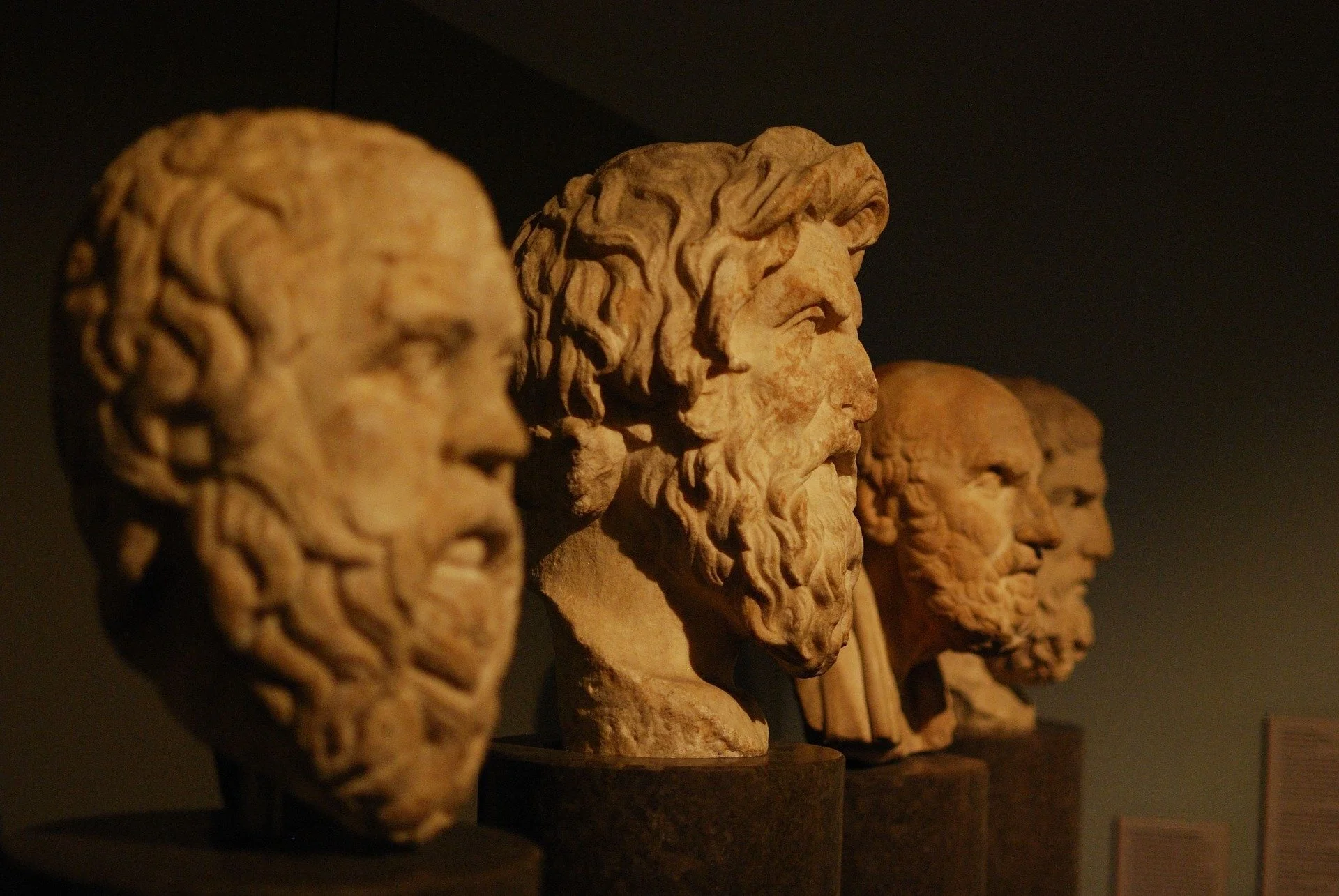Philosophy as Wisdom Literature: Learning From Philosophers Instead of Proving Them Wrong
I’ve come to realize that there are two very broad approaches to philosophy, one inspired by Socrates himself and one inspired by the tradition of wisdom literature.
When many people think of philosophy, they think primarily of the form of philosophy presented in Plato’s dialogues, with Socrates as a (frequently aggravating!) discussion partner constantly poking logical holes in his interlocutors’ arguments and disproving their proposed theories and viewpoints about the subject of any particular dialogue. This method of philosophy as Socratic questioning is known as Elenchus (ἔλεγχος). Those who view philosophy in this way, as a logical debate between conversation partners, generally hold an adversarial view of philosophy in which the goal is falsification, to refute the arguments of one’s interlocutor by probing and testing for logical holes, fallacies, contradictions, counterexamples, and so on.
Even though Socrates often claimed that he genuinely wanted to learn from his various conversation partners, those who view philosophy in this way generally interpret Socrates’s many statements to that effect ironically. From this point of view, Socrates merely claimed to want to learn from his interlocutors but secretly knew that his interlocutors didn’t really know what they claimed to know, a fact which he would soon reveal in the course of the ensuing conversations, a pattern repeated again and again in the course of Plato’s dialogues and which can be seen most clearly in the following statements from Socrates in Plato’s Euthyphro dialogue:
Socrates: And I, my dear friend, knowing this, am desirous of becoming your disciple. For I observe that no one appears to notice you—not even this Meletus; but his sharp eyes have found me out at once, and he has indicted me for impiety. And therefore, I adjure you to tell me the nature of piety and impiety, which you said that you knew so well, and of murder, and of other offences against the gods. What are they? (Plato, Euthyphro)
How should we interpret Socrates’s statement that he wishes to become the disciple (i.e., student) of Euthyphro in order to learn from him the nature of piety and impiety? It’s possible to interpret this statement of Socrates as an example of philosophical arrogance disguised as feigned humility, that Socrates has no intention whatsoever of learning from Euthyphro but that he is simply baiting Euthyphro into a conversation only to make a concerted effort to disprove anything and everything that comes out of Euthyphro’s mouth.
It’s also possible, however, to interpret Socrates more literally and charitably, accepting the truthfulness of his words that he genuinely wants to learn what Euthyphro has to teach him about piety and impiety, if it should turn out that Euthyphro genuinely has something to teach him after all. It’s difficult to distinguish between these two competing interpretations of Socrates’s motivations given that Socrates almost immediately, in the very next line of the dialogue, launches into his questioning of Euthyphro after claiming to want to learn from him:
Socrates: What are they? Is not piety in every action always the same? and impiety, again—is it not always the opposite of piety, and also the same with itself, having, as impiety, one notion which includes whatever is impious? (Plato, Euthyphro)
As anyone who has read the Euthyphro dialogue will know and remember, Socrates very quickly gets Euthyphro to reveal that Euthyphro’s answers to this and other questions by Socrates in the course of the dialogue are inadequate philosophically, that they lead to contradictions and inconsistencies that Socrates is all too ready to point out, whether in good faith with an eye toward the truth of the matter or from some other motivation, as Socrates is accused of having in his jury trial recounted in Plato’s Apology dialogue.
Without question much of Western philosophy has inherited this adversarial model of philosophical debate in the manner of Socrates. I have encountered many, many philosophers who take almost perverse delight in being ever at the ready to disprove any viewpoint, argument, example, or theory other than their own. Many of them, of course, claim to be humble about their own theories, looking at their own arguments as critically as they look at those of others. But there is often an air of feigned humility about them, just as it’s almost impossible not to read Socrates’s statements of professed humility ironically in light of the philosophical onslaught that immediately follows.
As I think about what it would mean to take Socrates’s humility seriously, I can’t help but think of the rich tradition of wisdom literature in the Western world, including works such as the book of Proverbs in the Hebrew Bible, the sayings of Jesus in the Christian New Testament, the writings of ancient stoic philosophers such as Seneca the Younger and Marcus Aurelius, various essays of Cicero, and so on. In wisdom literature, the goal is not to produce the best logical argument or the best counterargument against your intellectual opponent, but to pass down sayings and advice to those who are humble and receptive enough to genuinely learn something, or to internalize the advice being passed down and incorporate the practical lessons from that advice into one’s own life and thought.
Below are some examples of wisdom literature in various traditions and time periods.
Ancient Egyptian Wisdom Literature:
Biblical and Jewish Wisdom Literature:
Classical/Western Wisdom Literature:
Although wisdom literature as a genre is comprised of larger works such as those listed above, even the various fragments and sayings of the Prsocratic philosophers could be considered a type of wisdom literature insofar as they do not amount to well-worked-out philosophical arguments but shorter aphorisms intended to capture some essential truth about reality, often with a practical takeaway, such as Heraclitus’s statement that one cannot step in the same river twice, a practical reminder to people everywhere to expect change instead of constancy as the normal condition of life.
More recently in the history of philosophy, on could consider the writings of Henry David Thoreau (e.g., Walden, Walking, etc.) and the aphoristic writings of Friedrich Nietzsche (Human, All Too Human; Beyond Good and Evil; etc.) as a modern form of philosophical wisdom literature closer in spirit to the book of Proverbs than to Plato. In these and other examples of wisdom literature, the goal is not logical argument but to inspire, to awaken, to persuade, to orient one’s life toward some purpose or goal, to instill values, and so on.
(Walden Pond: Thoreau’s Walden could be interpreted as a form of modern wisdom literature.)
What does it mean to approach all of philosophy from the tradition of wisdom literature instead of the tradition of Socrates and the style of Socrates questioning that bears his name? How does one go about making philosophy less adversarial focusing in gleaning wisdom from the writings of various philosophers, even when those various philosophers contradict and disagree with one another, instead of merely trying to prove each philosopher wrong? Should the goal of philosophy be to reconcile the different competing viewpoints, arguments, and theories of each philosopher in an attempt to discern the objective truth of the matter, in some sort of gigantic, discipline-wide Platonic Symposium, a roundtable with the gadfly-like Socratic probing and questioning as the driving heartbeat and the spirt of philosophy as a whole?
Or should philosophy be more eclectic with philosophers picking and choosing and distilling essential kernels of wisdom from a wide range of philosophers and worldviews, no matter how much the original sources may disagree with or contradict one another? Should sayings of philosophers from every tradition and time period—Eastern and Western, ancient and modern, analytic and continental, philosophical and religious, literary and scientific—be collected into a massive anthology of philosophical wisdom for the ages, like the book of Proverbs on steroids?
Like that of many philosophers in the Western tradition, my entrée into philosophy was in the style of Socrates, and I’m thankful for the experience and the way in which it honed my faculties of critical thinking and logical reasoning. Now, however, approximately halfway through my life and halfway through my career as a philosopher, I find myself drawn more toward the wisdom literature tradition of philosophy, finding something essential, practical, wise, and valuable in the work of almost every philosopher I have ever read, even in the ones whose overall theories and worldviews strike me as wildly implausible (Leibniz’s monads, anyone?). I worry sometimes that Western philosophers who view philosophy in the adversarial tradition of Socrates sometimes throw out the proverbial baby with the bathwater; they don’t absorb the wisdom or the practical life lessons from the philosophers whose overall theories and arguments they so easily dismiss with the tools of logic and their relatively narrow methods of philosophical inquiry.
So, for me, even though the fundamental question of philosophy in the Western tradition has historically been “Where did this argument go wrong?” I find myself asking a different question as I reexamine the works of various philosophers I once dismissed and rejected. I now find myself asking at every turn “What can I learn from this?” which is a very different starting point, approach to, and purpose of philosophical inquiry than that demonstrated by Socrates and the tradition of Socratic inquiry he set in motion. And yet, this is the very same question Socrates so often asked his interlocutors at the beginning of nearly every one of Plato’s dialogues and essentially the same question Socrates asks Euthyphro: “What can I learn from you, Euthyphro?”
If we take Socrates at his work in sincerely asking his interlocutors what he can learn from them, aren’t we ourselves just as justified in asking what we might learn from Heraclitus or Parmenides, Plato or Aristotle, Seneca or Cicero, Zeno or Epictetus, Augustine or Aquinas, Descartes or Hume, Leibniz or Spinoza, Locke or Berkeley, Kant or Hegel, Nietzsche or Wittgenstein, Husserl or Heidegger, Kierkegaard or Camus, Foucault or Lyotard, David Lewis or Peter Singer, no matter how much these philosophers may quibble among themselves about philosophical minutiae?
(Philosophy should be as much about listening to other philosophers and gleaning wisdom from them as it is about argument analysis and the Socratic method.)
I challenge contemporary philosophers to look beyond mere argument analysis, mere logic, mere Socratic debate, and beyond the boundaries of any particular worldview or tradition. Try to discern not only the weakness or the logical flaws within the arguments of any particular philosopher whose work you would so easily dismiss, but the kernels of wisdom that each philosopher has to offer. After all, the Greek word philsophia (φιλοσοφία) doesn’t mean “love of argument”; it means “love of wisdom.” And we philosophers do philosophy as a discipline, and the history of philosophy as a whole, a disservice when we interpret philosophy narrowly as mere argument analysis and merely as clever falsification of wildly implausible and often crazy-sounding philosophical theories.
The many, many philosophers throughout the history of philosophy, both well-known and obscure, all have something valuable to say to us, if we contemporary philosophers would humble ourselves up and simply quiet ourselves to really listen, to become their disciples, as Socrates once asked to become the disciple of Euthyphro.














